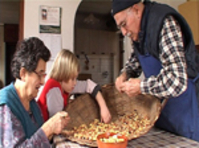The Art of Cooking March 19, 2010
on wednesday
evening worldfilm held a teaser event at genialistide klubi in tartu
to promote the upcoming festival. taavi tatsi asked me to say a few
words of introduction for the film, which was flattering, even if i
didn't quite understand why he choose me, an unknown newcomer to this
fine city. i understood a bit better after watching the copy of the
film he gave me, on my own with grumbling stomach at my present home
in mooste. the film, by director joseph péaquin, is entitled "c'era
una volta… le delizie del piccolo mondo" (in english: "once
upon a time… delicacies of a small world"; or in estonian: "
oli kord… maitseelamused väiksele maailmale").
my name
is patrick mcginley. originally from america, i am now living here in
estonia, currently in mooste, working with the moks centre for art
and social practice. i am a sound artist, but i also very much like
to cook, which is certainly the real reason taavi asked me to make
this introduction. taavi introduced my introduction in estonian (of
course; and i'm proud to say i began my introduction in my own
version of estonian as well), so, although i caught several words
(including his announcement that it was, in fact, st patrick's day,
which i had completely forgotten) i don't know quite who he told the
audience i was. he may or not have told them that i am a cook, and he
may or may not have told them that i am a *good* cook, and these
things may or may not be true, but i do think it is fair to say that
i am an *enthusiastic* cook, and i believe cooking is one of those
realms where enthusiasm is worth a great deal. you can trick people
into thinking almost anything tastes good if you look like you had a
lot of fun making it - i know this from experience. in any case, this
film was to show us a wonderful mixture of enthusiasm, knowledge,
experience and skill.
this was also a good opportunity for me
to mention one of our recent endeauvours: last month moks launched
the mooste toiduklubi, an opportunity for people from the local
community to gather to, essentially, cook and eat together. mooste is
without any public gathering point; there are no restaurants or
cafés, no place where locals can meet and socialize. with the mooste
toiduklubi we hope to create such a space, even if it is temporary
and movable, with a hope of introducing the idea into the village
consciousness. we also want to share our own traditional recipes,
learn others from the area and from our neighbors, and explore what
can be prepared using only local produce. each month a different cook
will plan and host a toiduklubi meal, open to everyone in the
village.
the protagonists of our film share many of these ideas, although while our foodclub is acting perhaps out of conscious political choice, erminio and attilia, the retired couple in the film who have lived all there lives in arnad, a small village in the aoste valley in the italian alps, live these ideas simply as a way of life. they keep animals and a large garden, waste nothing (even their dried turnip peels, which they fry with potatoes. "it tastes like tripe," one of them asserts), and gather wild mushrooms, berries, nuts, and herbs year round. they cook simply with traditional recipes handed down by their families, with all grown and gathered ingredients, often served on a bed of steaming polenta, the cornmeal porridge that, originally a peasant food, is a culinary staple in the region. the aoste valley is a politically autonomous region within italy, like the islands of sicily and sardinia and a few other regions. it is located just at top left-hand corner of the boot, bordered by france to the west and switzerland to the north. the local language is valdotain, a dialect of franco-provençal, also known as arpetan. as a french speaker i am able to recognise the occasional word, and perhaps an italian speaker would find the same, but for the most part this is an entirely independent language, spoken by a small population (the aoste valley has the lowest population density in italy) is an autonomous region. a small world indeed, something that i think perhaps we here in estonia can relate to…
patrick mcginley
